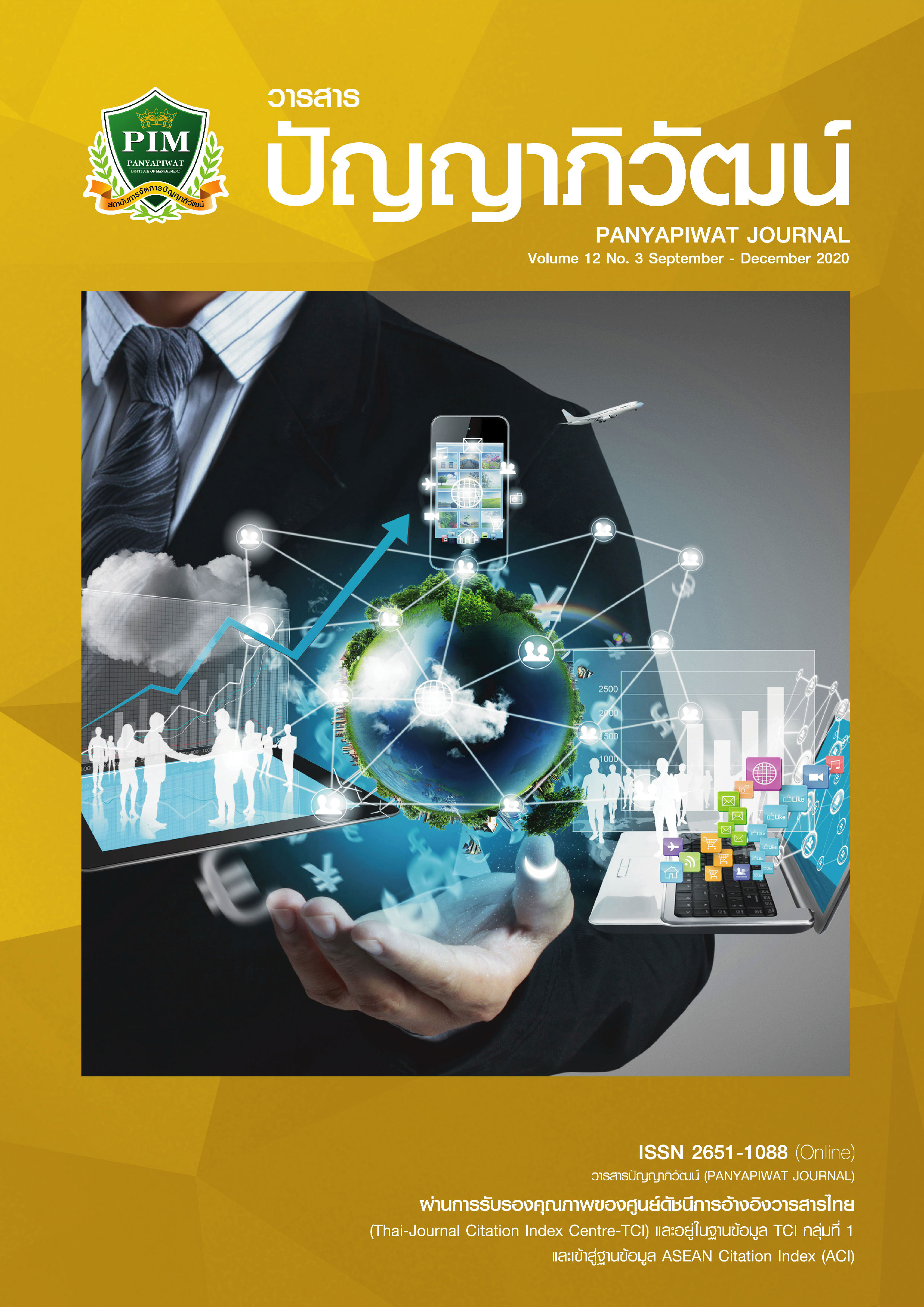เทคโนโลยีทางปัญญาเพื่อการศึกษาอัจฉริยะ
Main Article Content
บทคัดย่อ
เทคโนโลยีทางปัญญาเป็นการพัฒนาและขยายขีดความสามารถของปัญญาประดิษฐ์ให้สามารถรับรู้ เรียนรู้ คิดวิเคราะห์เพื่อตัดสินใจและสนทนาโต้ตอบกับมนุษย์ได้ด้วยภาษาธรรมชาติ สามารถช่วยเพิ่มประสิทธิภาพในการทำงาน กำหนดและวางแผนการทำงานได้อัตโนมัติ ตลอดจนสามารถตรวจสอบและค้นหาข้อเท็จจริงต่าง ๆ เพื่อสรุปหรือตัดสินใจได้อย่างถูกต้องตามข้อเท็จจริงของข้อมูลนั้น ๆ โดยอัตโนมัติ และผู้เขียนได้สังเคราะห์เอกสารและงานวิจัยที่เกี่ยวข้องเพื่อนำเสนอเป็นรูปแบบที่สามารถนำเทคโนโลยีทางปัญญามาประยุกต์ใช้เพื่อพัฒนาการศึกษาได้ 4 ด้าน ได้แก่ 1) ด้านการบริหารการศึกษาอัจฉริยะ (Smart Administration) เพื่อช่วยเพิ่มประสิทธิภาพในการทำงานด้านการบริหารให้เป็นระบบอัตโนมัติ 2) ด้านการพัฒนาหลักสูตรอัจฉริยะ (Smart Curriculums) พัฒนาหลักสูตรให้เป็นหลักสูตรที่มีเนื้อหาสาระทางดิจิทัล 3) ด้านระบบการเรียนรู้อัจฉริยะ (Smart Learning System) ปรับเปลี่ยนระบบการเรียนรู้ของผู้เรียนให้หลากหลายและสามารถเข้าถึงได้อย่างสะดวกสบายตามความสนใจหรือตามความต้องการของผู้เรียน และ 4) ด้านการส่งเสริมและสนับสนุนการเรียนรู้ของผู้เรียนแบบอัจฉริยะ (Smart Learner) ช่วยวิเคราะห์รูปแบบพฤติกรรมการเรียนรู้และสภาพปัญหาต่าง ๆ ของผู้เรียน ซึ่งจะช่วยให้ครูสามารถปรับเปลี่ยนเนื้อหาสาระและกิจกรรมการเรียนรู้ ให้สอดคล้องกับความสนใจ ความถนัดและความต้องการของผู้เรียนแต่ละคนได้เป็นอย่างดี ตลอดจนช่วยสร้างแรงจูงใจและกระตุ้นการเรียนรู้ให้กับผู้เรียนได้อย่างมีประสิทธิภาพ
Article Details
“ข้าพเจ้าและผู้เขียนร่วม (ถ้ามี) ขอรับรองว่า บทความที่เสนอมานี้ยังไม่เคยได้รับการตีพิมพ์และไม่ได้อยู่ระหว่างกระบวนการพิจารณาลงตีพิมพ์ในวารสารหรือแหล่งเผยแพร่อื่นใด ข้าพเจ้าและผู้เขียนร่วมยอมรับหลักเกณฑ์การพิจารณาต้นฉบับ ทั้งยินยอมให้กองบรรณาธิการมีสิทธิ์พิจารณาและตรวจแก้ต้นฉบับได้ตามที่เห็นสมควร พร้อมนี้ขอมอบลิขสิทธิ์บทความที่ได้รับการตีพิมพ์ให้แก่สถาบันการจัดการปัญญาภิวัฒน์หากมีการฟ้องร้องเรื่องการละเมิดลิขสิทธิ์เกี่ยวกับภาพ กราฟ ข้อความส่วนใดส่วนหนึ่งและ/หรือข้อคิดเห็นที่ปรากฏในบทความข้าพเจ้าและผู้เขียนร่วมยินยอมรับผิดชอบแต่เพียงฝ่ายเดียว”
เอกสารอ้างอิง
Cambridge Dictionary. (2019). "AI". Retrieved September 18, 2019, from https://dictionary. cambridge.org/dictionary/english/ai
Coccoli, M., Maresca, P., & Stanganelli, L. (2016). Cognitive computing in education. (Vol. 12): Italian e-Learning Association.
Choque-Díaz, M., Armas-Aguirre, J., & Shiguihara-Juárez, P. (2018). Cognitive technology model to enhanced academic support services with chatbots. Paper presented at the 2018, 8-10 Aug. IEEE XXV International Conference on Electronics, Electrical Engineering and Computing.
Dandashi, A., Karkar, A., AlJaam, J., El-Seoud, S. A., & Ibrahim, O. (2015). Framework for development of cognitive technology for children with hearing impairments. Paper presented at the 2015, 20-24 Sept. International Conference on Interactive Collaborative Learning (ICL).
David, S., Craig, M., & Ragu, G. (2015). Demystifying Artificial Intelligence. Deloitte University Press. Retrieved September 18, 2019, from http://www.theatlantic.com/sponsored/ deloitte- shifts/demystifying-artificial-intelligence/257/
Dialani, P. (2018). "Cognitive Technologies are Double-Edged". Retrieved September 20, 2019, from https://www.analyticsinsight.net/cognitive-technologies-are-double-edged/
Dyachenko, N. N. Y., Bondarenko, M. P. G., & Pustovit, V. (2017). Intelligent and Cognitive Technologies in Education of International Economic Relations Students and Human Resource Development: Methodology in Language Teaching and Distance Learning. European Journal of Sustainable Development, 6(4), 353–360.
Hayath, Z. (2018). "3 Reasons Why Artificial Intelligence Can Revolutionize Education". Retrieved September 8, 2019, from https://www.entrepreneur.com/article/323470
Heath, N. (2018). "What is AI? Everything you need to know about Artificial Intelligence".
Retrieved September 18, 2019, from https://www.zdnet.com/article/what-is-ai-everything-you-need-to-know-about-artificial-intelligence/
Heinrichs, J.-H. (2018). Neuroethics, Cognitive Technologies and the Extended Mind Perspective. Neuroethics. doi:10.1007/s12152-018-9365-8
Internetsociety. (2017). “Artificial Intelligence and Machine Learning: Policy Paper”. Retrieved September 18, 2019, from https://www.internetsociety.org/wp-content/uploads/2017/08/ISOC-AI-Policy-Paper_2017-04-27_0.pdf
Janpirom, N. et al. (2019). Educational Technology Within Thailand 4.0. Panyapiwat Journal, 11(1), 304–314. [in Thai]
Johnson, A. (2019). “5 Ways AI Is Changing the Education Industry”. Educational Technology. Retrieved September 8, 2019, from https://elearningindustry.com/ai-is-changing-the-education-industry-5-ways
Lin, K., et al. (2019). Artificial-Intelligence-Based Data Analytics for Cognitive Communication in Heterogeneous Wireless Networks. IEEE Wireless Communications, 26(3), 83–89.
Liu, Y., & Tang, P. (2018). The prospect for the application of the surgical navigation system based on artificial intelligence and augmented reality. Proceedings - 2018 IEEE International Conference on Artificial Intelligence and Virtual Reality, AIVR 2018, 244–246.
Lynchmay, M. (2018). "7 Roles for Artificial Intellegence in Education". The Tech Edvocate.
Retrieved September 18, 2019, from https://www.thetechedvocate.org/7-roles-for-artificial-intelligence-in-education/
National Strategy. (2018). National Strategy of Thailand (2018-2037). Government Gazette. Retrieved 28 August 2019 from http://www.ratchakitcha.soc.go.th/DATA/PDF/2561/A/ 082/T_0001.PDF [in Thai]
Nesterova, M. (2017). Educational Cognitive Technologies as Human Adaptation Strategies. Future Human Image, 1(7), 102–112.
Rouse, M. (2017). “AI (artificial intelligence)”. AI in IT tools promises better, faster, stronger ops. Retrieved September 18, 2019, from https://searchenterpriseai.techtarget.com/definition/AI-Artificial-Intelligence
Schmelzer, R. (2019). "AI Applications in Education". Cognitive World. Retrieved September 8, 2019, from https://www.forbes.com/sites/cognitiveworld/2019/07/12/ai-applications-in-education/#419b999862a3
Schroer, A. (2019). "12 companies using AI in education to enhance the classroom". Retrieved September 8, 2019, from https://builtin.com/artificial-intelligence/ai-in-education
Thought, T. (2018). "10 Roles For Artificial Intelligence In Education". Retrieved September 18,
Vodyaho, A., et al. (2019). Cognitive Technologies in Monitoring Management. Automatic Documentation and Mathematical Linguistics, 53(2), 71–80.
Watts, E. (2018). "9 ways to use Artificial Intelligence (AI) in education". Bigdata-madesimple. Retrieved September 10, 2019, from https://bigdata-madesimple.com/9-ways-to-use-artificial-intelligence-in-education/


